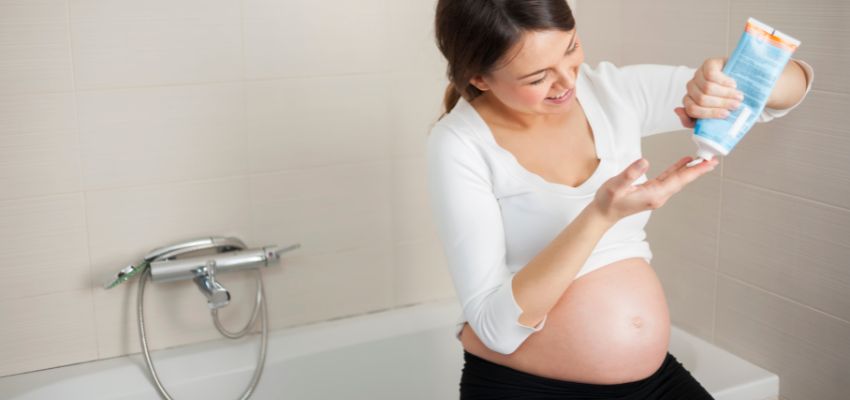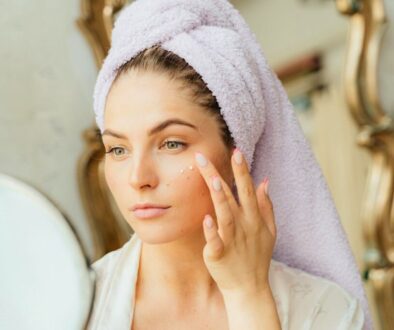Is Kojic Acid Safe During Pregnancy? What Experts Say

Published April 9, 2025
Pregnancy is an exhilarating journey, but it raises many questions, particularly regarding what’s safe for you and your baby. Skincare can be tricky, leaving many moms-to-be unsure about the ingredients in their favorite products. If you have skin discoloration or uneven skin tone issues, kojic acid might be your solution. But here’s the big question: is kojic acid safe during pregnancy?
In this article, we’ll explore how kojic acid works, examine its safety during pregnancy, and discuss expert opinions. We aim to help you make informed choices for your skincare routine and your little one’s health.
What Is Kojic Acid?
Kojic acid is a natural compound made by fungi during rice fermentation, a process famously used in making Japanese sake. It’s popular in skincare for its ability to brighten skin and reduce dark spots, melasma, and acne scars. Commonly found in serums, creams, and soaps, kojic acid is a go-to solution for those seeking a more radiant and even complexion.
How Kojic Acid Fights Hyperpigmentation
Kojic acid inhibits tyrosinase, an enzyme responsible for melanin production. Melanin gives skin its color. By reducing melanin, kojic acid helps fade hyperpigmentation. It’s a popular choice for treating melasma, especially during pregnancy.
Why It’s A Go-To For Pregnant Women
Pregnancy often causes noticeable skin changes. One common change is melasma, or the “mask of pregnancy.” It leads to dark, patchy spots on the skin. The allure of brighter, even-toned skin makes kojic acid a popular choice for many expectant mothers. However, questions about its safety during pregnancy continue to spark discussion.

Is Kojic Acid Safe During Pregnancy?
Kojic acid is a common skincare ingredient that helps brighten skin and reduce pigmentation. If you’re pregnant, you might wonder if it’s safe. Knowing its effects during pregnancy can help you decide on your skincare routine.
Dermatologist’s Insights On Kojic Acid Use During Pregnancy
Kojic acid is widely regarded as safe for use in cosmetic products. However, its safety during pregnancy remains uncertain due to limited research. A study suggests that kojic acid has minimal absorption into the body and is unlikely to pose a risk to the baby. Many dermatologists recommend caution. They advise women to avoid kojic acid during pregnancy and breastfeeding to ensure safety.
Risks And Sensitivities To Be Aware Of
Pregnancy can make your skin more sensitive. Hormonal changes may trigger irritation. Products like kojic acid that worked before might no longer suit your skin. There’s a slight chance of absorption into the bloodstream, raising concerns about potential exposure to the fetus.
Why Patch Testing And Proper Concentration Matter
If you use kojic acid, prioritize safety. Choose products with low concentrations, ideally 1% or less. Always do a patch test before applying it to larger areas. Consulting your doctor beforehand is highly recommended to further minimize risks.
Safer Alternatives To Kojic Acid For Expecting Moms
Expecting moms want effective and safe skincare during pregnancy. While kojic acid is known for brightening skin, it may not be ideal. Try safer alternatives to keep your skin glowing without risks.
Skincare Ingredients To Avoid During Pregnancy
During pregnancy, you must be mindful of the skincare products you use. Ingredients like hydroquinone, retinoids, and high-dose salicylic acid can be risky, so it’s best to avoid them. Understanding what’s in your products empowers you to make safer, more informed choices for you and your baby.
Safe Brightening Solutions During Pregnancy
Looking for safe ways to manage pigmentation during pregnancy? Here are expert-approved options.
- Vitamin C. A powerful antioxidant that brightens the skin. It boosts collagen production. It fades dark spots from pigmentation or sun exposure. It’s a great addition to your routine for a more radiant complexion.
- Azelaic acid. This ingredient has anti-inflammatory and antibacterial properties. It helps treat acne, reduce redness, and even out skin tone. Safe for use during pregnancy, it’s a go-to for maintaining clear and balanced skin.
- Mineral sunscreen. Choose sunscreen with zinc oxide or titanium oxide. They offer broad-spectrum protection from harmful UV rays. These non-toxic formulas help prevent skin pigmentation. They’re essential for healthy skin during pregnancy.
- Liposomal Aloe Vera. A gentle yet effective solution shown in studies to safely reduce melasma and hyperpigmentation during pregnancy. Its soothing properties also calm irritated skin, making it a versatile choice for sensitive skin.
- Turmeric-Based Skincare. Turmeric is known for its anti-inflammatory and skin-brightening benefits. It’s a safe, time-tested option. AMVital’s turmeric skincare line provides a gentle, plant-based way to boost your glow safely.
These options provide a safe, practical approach to maintaining radiant skin while expecting.
How To Maintain An Effective Skincare Routine
- Keep your skin hydrated with pregnancy-safe moisturizers to maintain elasticity and prevent dryness. When seeking skincare products, look for hyaluronic acid or ceramides. These components help to retain moisture while minimizing the risk of irritation.
- Use gentle cleansers instead of harsh exfoliants. This helps prevent irritation and protects natural oils. Choose a mild, fragrance-free formula that cleans without drying your skin.
- Simplify your routine. Stick to the basics: cleanser, moisturizer, and sunscreen. Using numerous products can overwhelm your skin and result in adverse reactions. Simplifying your routine can promote healthier skin.
Frequently Asked Questions
Can you use kojic acid on your face during pregnancy?
Limited studies suggest kojic acid has minimal risks. However, experts advise avoiding it during pregnancy and breastfeeding to stay cautious.
What kojic acid concentration is safe to use?
Products with kojic acid at 1% concentration or lower are less likely to irritate. However, it’s always best to consult your doctor before use.
Are kojic acid creams or serums better for sensitive skin?
Creams are great for sensitive skin. They often contain hydrating ingredients to help reduce irritation.
What should you do if you experience a reaction while pregnant?
If you experience redness, itching, or irritation, discontinue use immediately and seek advice from your dermatologist or healthcare provider.

Making The Best Skincare Choices During Pregnancy
Skincare during pregnancy can be tricky. Concerns like melasma or hyperpigmentation often arise. A common question is, “Is kojic acid safe during pregnancy?” Kojic acid is known for its brightening effects. However, its safety during pregnancy isn’t fully confirmed due to limited research. Experts suggest being cautious. Thankfully, there are effective and safe alternatives available.
Stay informed to care for your skin safely. Prioritize your wellness and that of your little one. Choose dermatologist-approved ingredients like azelaic acid. Try natural options like AMVital’s turmeric skincare products. Self-care starts with confident, well-researched choices!
Unlock the Power of Turmeric With AMVital Products
Experience the transformative effects of AMVital’s meticulously formulated turmeric-infused products. Indulge in the luxurious goodness of our expertly crafted skincare and haircare range. Harness the incredible natural benefits of this golden spice and discover the remarkable power of turmeric. Explore our shop now and unlock radiant, healthier-looking skin and hair. Visit our shop to experience AMVital’s finest turmeric products.

This Content Has Been Reviewed For Factual Accuracy
The information presented here has been meticulously checked by our internal experts. To learn more about our rigorous editorial process, you can click here.

About The Author
I’m Corinne Grace, a passionate writer for AMVital.com. I create articles based on sound scientific evidence to help you make healthy decisions. As a nurse, I’ve been on the front lines, seeing the critical importance of accurate information.


